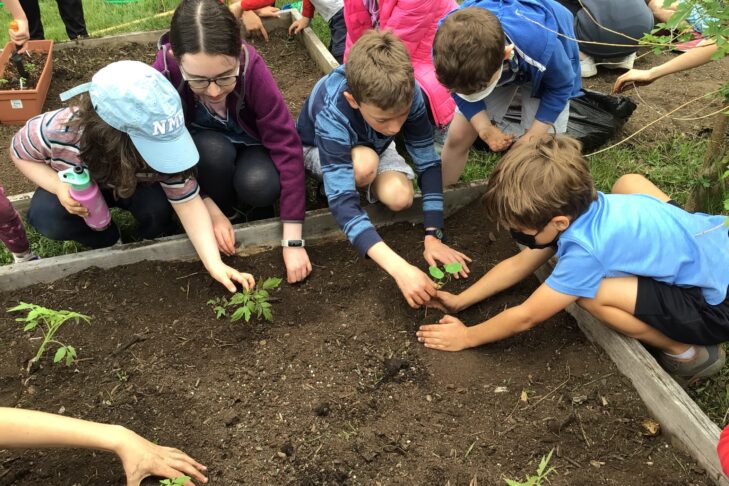וַיֹּ֣אמֶר אֱלֹהִ֗ים הִנֵּה֩ נָתַ֨תִּי לָכֶ֜ם אֶת־כׇּל־עֵ֣שֶׂב ׀ זֹרֵ֣עַ זֶ֗רַע אֲשֶׁר֙ עַל־פְּנֵ֣י כׇל־הָאָ֔רֶץ וְאֶת־כׇּל־הָעֵ֛ץ אֲשֶׁר־בּ֥וֹ פְרִי־עֵ֖ץ זֹרֵ֣עַ זָ֑רַע לָכֶ֥ם יִֽהְיֶ֖ה לְאׇכְלָֽה׃ וּֽלְכׇל־חַיַּ֣ת הָ֠אָ֠רֶץ וּלְכׇל־ע֨וֹף הַשָּׁמַ֜יִם וּלְכֹ֣ל ׀ רוֹמֵ֣שׂ עַל־הָאָ֗רֶץ אֲשֶׁר־בּוֹ֙ נֶ֣פֶשׁ חַיָּ֔ה אֶת־כׇּל־יֶ֥רֶק עֵ֖שֶׂב לְאׇכְלָ֑ה וַֽיְהִי־כֵֽן׃
God said, “See, I give you every seed-bearing plant that is upon all the earth, and every tree that has seed-bearing fruit; they shall be yours for food. And to all the animals on land, to all the birds of the sky, and to everything that creeps on earth, in which there is the breath of life, I give all the green plants for food.” And it was so (B’reisheet 1:29-30).
“Millions saw the apple fall, but Newton asked why.”
—Bernard Baruch, American financier
The year of science and STEM education has been filled with asking “why,” helping students to make discoveries and integrating secular subjects with Jewish learning. It’s been such an exciting year. Please enjoy an overview of our year of learning in seventh grade science.
As a foundational lesson, seventh graders learned about the role that plants play as a principal resource in all of the ways they support life on earth. Students examined how plants release oxygen into the atmosphere, absorb carbon dioxide, provide habitats for wildlife and humans, regulate the water cycle and play an important role in feeding the earth’s life, including humans, all while using the energy of the sun.
Further supporting the garden, and as part of their final project, the JCDS Robotics Club set to work on an irrigation system to help plants grow in an efficient way. Using the inputs of humidity, temperature, water and light sensors, students determined the most efficient way to care for the plants and built a system to do so.
Finally, the seventh graders will bring it all together, a meaningful representation of STEM integration, by ending the year with a design challenge. Students will design and build a model city for the future, ensuring a healthy balance of water, carbon and nitrogen cycles, urban compost, green areas, healthier environments and improved lifestyles, green energies and energy efficiency in companies, offices, schools and homes. Thinking about a better future for our families and the roles that schools play, Jordana K-T. shared, “We are role models and our legacy will be passed down.” It is our responsibility to protect the environment, and JCDS seventh graders are taking the lead.
Seventh graders then learned how photosynthesis in plants works by first understanding the nature of light, including the spectrum of electromagnetism. They also learned about how colors have different energy levels that plants use in order to create their own food.
Seventh grader Laila F. shared: “I got to learn in a way that explained how things happen rather than just what happens. For example: photosynthesis. I first learned how plants use the chloroplast in what is used to photosynthesize, then I learned how the different kinds of light affect the plant and go into the chloroplast in different ways, then I learned what it really means when photosynthesis happens, and learning all this stuff and putting it together taught me only one tiny piece of biology, but somehow, I managed to learn everything else this exact way. I was able to put all the separate pieces together and now I have the ability to understand so much more. I didn’t just learn science but I learned how to understand science.”
With the frame of light, electromagnetism and photosynthesis, seventh graders began working in the JCDS garden, bringing together several subject areas. First, they began growing plants for the summer harvest, including pumpkin, tomato, basil, watermelon, cucumbers and cilantro. Seventh graders also learned about composting as a means for creating healthy growing conditions, as well as its positive environmental impact. Rose N. shared, “Composting takes hard work and time. We have to take food scraps and weeds from gardens and decompose them, but in the end, we must compost to make a better earth for us and everyone who comes after so that our world can be healthy.”
Their learning about plants and the importance of gardening rippled out as they brought their knowledge to younger children, teaching them about the importance of gardening by transplanting the indoor plants to the outdoor garden. Frieda N. wrote, “I learned about the importance of being able to do science projects with younger kids, because you are helping them learn, and that is important.” Amitai Z. also shared the power of “helping the little kids to understand the joy of planting, and ultimately creating life.”
Avraham Sosa is a middle school science teacher at JCDS.
The School Sparks blog appears periodically by various writers among the JCDS educational team. Learn more about JCDS, Boston’s Jewish Community Day School.
This post has been contributed by a third party. The opinions, facts and any media content are presented solely by the author, and JewishBoston assumes no responsibility for them. Want to add your voice to the conversation? Publish your own post here. MORE


